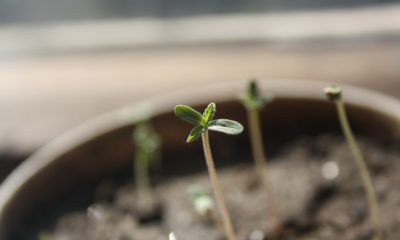The Price of Advocacy
Casey O’Neill of HappyDay Farms has spent years fighting for small farmers, but with California cannabis regulations tightening, he asks, “For what?”
Nobody likes to hear “I told you so” ringing in their ears. But today, as California’s small cannabis farmers face increasing challenges in the legal industry, the sneering refrain practically echoes down the redwood canyons of the Emerald Triangle, its four cutting syllables carried in each morning with the fog.
For Casey O’Neill, who has been one of the most public and outspoken advocates for a small-farm-friendly version of cannabis legalization since 2014, the “I told you so” carries a particular punch. He is a native son of Mendocino County, raised on a homestead north of Laytonville where he still lives, farming vegetables and cannabis on the land with his partner Amber and their family. He’s seen the harsh nature of the government. Law enforcement stormed his parents’ house before his third birthday over a few cannabis plants, and when he was older and working as a cannabis grower, he was swept up in a raid and served two months in county jail.

But by the time California started to seriously consider cannabis legalization in the 2010s, O’Neill believed it was a good idea. Legal pot, he thought, was a great way to support small farmers and California’s rural economies and keep people out of prison. He still trusts in this vision. Where he thinks he might have been wrong, in retrospect, is in judging the government’s ability to actually execute those policies.
“I went in with this possibly naïve idea that we were going to construct a regulatory paradigm that was built around small businesses — and we came f*cking close, that’s the devastating part,” O’Neill says. “I invested significant time, energy and faith in a governmental process and then had that faith shattered. And now, all of the old hippies are like, ‘I f*cking told you so. You f*cking thought they were going to play fair?’ It’s really disenchanting.”
Fighting for the Right to Farm
The year 2016 may feel like 10,000 lifetimes ago, but it’s worth remembering that before California passed its adult-use cannabis legislation, it was extremely rare for cannabis growers to speak proudly and openly about their craft in the halls of power. O’Neill was one of the handful that stepped forward.
As a board member for the Emerald Growers Association, O’Neill spent the mid-2010s speaking in front of the Mendocino County supervisors and to state legislators in Sacramento about how cannabis legalization could be a crucial lifeline for small farmers. In his straw hat, skin roughed by the sun, and cotton work clothes, O’Neill made the case over and over that cannabis growers were simply small farmers that needed support.
“For Amber and I, for quite a long time we were almost like the funny stepchildren. We didn’t really fit with the food farmers because we were cannabis farmers, and vice versa,” O’Neill says. “The central focus of advocacy for me has been to break down that false bifurcation.”

O’Neill spent his youth farming only cannabis, but after his 2008 arrest for growing, he switched to farming vegetables in 2009.
“When I was going through my court case, I realized: I’m a monocrop farmer and I just lost my crop,” O’Neill says. “I had some cogitation around what I want my future to look like and I started to look at food farming.”
He took a few courses on farming vegetables and fertilizers before he began serving time, and in jail, had a job working in the jail garden and read as many books on organic farming as he could from the jail library.
“The running joke is that my friends say, ‘It seems you were effectively rehabilitated,’” O’Neill says with a laugh.
In 2010, the state of California took its first big swing at legalizing cannabis with Proposition 19. At the time, the terms of O’Neill’s probation kept him from cultivating cannabis and he didn’t take much of a public stance on the issue. The effort ultimately failed, with all three Emerald Triangle counties voting against the proposition.
Then in 2014, a coalition including California’s police chiefs sponsored a cannabis regulation bill, SB 1262. The state’s medical cannabis industry despised it. O’Neill, who had gotten off probation and formed a medical marijuana collective in 2013, started advocating against it — and for a vision for legalization that included bringing California’s thousands of underground cannabis farmers into compliance.
“In 2014, the police chief sponsored a bill in the state legislature that would have licensed 30 farms in the state,” he says. “It was a de facto lockout for our whole community. That was what really got us organized.”
He worked as the secretary of the Emerald Growers Association and a board member of the Mendocino Cannabis Policy Council. He hosted events, talked to lawmakers, and helped cannabis advocates come up with a plan for small-farmer-friendly cannabis legalization.

“Every other industry sends lobbyists to tell government how to think, so finally as an industry, we are realizing if this is how it works in America, we are going to have to play ball,” O’Neill told the Associated Press in 2015, before he and other members of the Emerald Growers Association went off to lobby assemblymembers in Sacramento.
After months of work at the state level, Proposition 64 was born: a plan to legalize cannabis with regulations coming from the Department of Agriculture, no cap on licenses, appellations and tiered licensing.
“And we were successful,” O’Neill says. “Coming out of 2015, we thought ‘Wow this is going to work! Holy sh*t!’”
In November 2016, California voted to pass Prop. 64. All three counties of the Emerald Triangle voted in favor, though by small margins. But O’Neill says the vision for small farmers only partially achieved.
“On the one hand, it has worked. I am here. The state has been here and inspected this farm and we’re legal,” says O’Neill. “On the other hand for so many other farmers, it didn’t f*cking work.”
And this discrepancy has been challenging for O’Neill to come to terms with.
“It’s so bittersweet. To feel both that I’ve been tremendously successful and a total f*cking failure at the same time is one of the most potent dichotomies of my life,” he says.
So what went wrong?

The State’s Plan for Pot
I visited O’Neill one warm autumn day on his family’s homestead, HappyDay Farms, in the hills outside of Laytonville. As he watered vegetable sprouts in a hoop house, O’Neill rattled off examples of how differently California regulates vegetables versus adult-use cannabis.
From the price of scales to cottage licenses, it boils down to two main issues: cannabis involves mountains more paperwork and bundles more cash.
HappyDay Farm’s permit to sell vegetables costs $25 a year, O’Neill says. Its permit to sell cannabis from Mendocino County costs $675, plus a $1,300 application fee, plus $2,410 for a permit from the state government, plus $1,800 to the state water board, plus $625 to the Department of Fish & Wildlife, plus $750 for its rainwater collection pond — and we haven’t even gotten to taxes yet.
“It’s not even nickel and diming me, it’s hundred and two hundred-ing me,” O’Neill says.
“It’s a classic example of regulatory creep in which a given populace with very little political power runs up against a regulatory development process in which every agency is excited and waiting to do things they aren’t allowed to do with the agricultural industry because their lobby is too strong,” O’Neill says, breaking down the issue with his trademark mix of political verbosity and casual profanity. “It’s like the state is saying to us, ‘We’re going to f*ck you guys up.’ It’s been really frustrating. I’ve been an advocate of sensible regulations and at every step of the way they’re pushing back and saying, ‘No, not really.’”
HappyDay Farms isn’t a large operation. It’s tucked on a sun-splattered hillside, with terraces that O’Neill and his family built in 2012 and rocky soil they’ve been carefully building up for years with compost and perennialized plants.
With the base cost of running a cannabis farm so high, the state has essentially forced cannabis farmers to work on a large scale in order to meet those costs. To combat this big-ag-favoring paradigm, O’Neill is advocating for a cottage license for cannabis farms with less than 2,500 square feet of cannabis canopy that includes an exemption from all regulations except testing.
“We fought really, really hard for a cottage license in the cannabis industry, so they made a cottage license,” O’Neill says. “But with cottage food production, a cottage license means that you are exempt from a lot of regulations. With cottage cannabis licenses, it’s just a nice name.”
Notably, California put forth cannabis regulations after Prop. 64 that don’t prohibit people from stacking multiple cottage licenses together to make a large grow. Perhaps most controversially, the regulations also do not include the acreage cap that state law mandated, which would have kept cannabis farms below one acre until 2023.
O’Neill also takes issue with the state’s track-and-trace system (“It’s the dumbest time-suck nightmare stupidest thing in history period.”) and the state’s general attitude that cannabis growers are presumed to be criminals from the outset and must be tightly regulated (“It’s like ‘Star Wars’: ‘The more you tighten your grasp, the more star systems will slip through your fingers.’”).
Plus, in 2019, the state of California started ramping up enforcement actions against those farmers who hadn’t joined the legal cannabis industry yet.
“There’s the talking point that people chose not to get a permit and now they have to pay some consequences,” says O’Neill. “The assumption of choice in the matter is where the real travesty occurs. If you build a system that locks people out and then you blame them for not participating in that system, that’s social injustice.”
These farmers, who haven’t signed up for the paperwork and the taxes and the regulations, have good reason to mistrust the state. They too fear hearing “I told you so.”

Hope Springs Eternal
For about an hour, O’Neill has been walking me around the farm. We’ve been working our way slowly up and down the terraced hillside, stopping to smell the massive colas of Glueberry, Great Success, Ogreberry and other exceptional strains HappyDay has finishing in the autumn sun. It’s a jarring juxtaposition: Beautiful scenery, depressing conversation.
But even the conversation itself contains multitudes: O’Neill is quick to laugh, quick to empathize, quick to pepper quips into a dark realization. We’ve talked ourselves in circles about O’Neill’s history advocating for cannabis and about the impact he’s had, what it means, whether or not it’s been positive. And on each topic, we’ve returned again and again to a dialectic understanding that the good and bad are simultaneously true.
“It’s always both,” O’Neill says. “The truth lies in between.”
For O’Neill, a farmer who has made regenerative practices the backbone of HappyDay’s work and his own advocacy, it comes back to the land.
“The thing to me in terms of advocacy around the regenerative movement is look, we all are where we are,” he says. “We’re all trying to figure out how to get to some as-yet-undefined better. Every year, we make strides in that direction. We try and lower inputs, lower our carbon footprint, we try and sequester more carbon so we’re offsetting our footprint. But there are inevitable compromises, like keeping our rabbits in cages.”
With improving as a farmer and a human, while asking the state to improve as an advocate, O’Neill has taken a nuanced approach to the idea of progress.
“You try to make measurable gains and measurable steps in the right direction each year,” he says. “You get better in your practices, you learn more, and that’s life.”
TELL US, are you an advocate for marijuana?



























